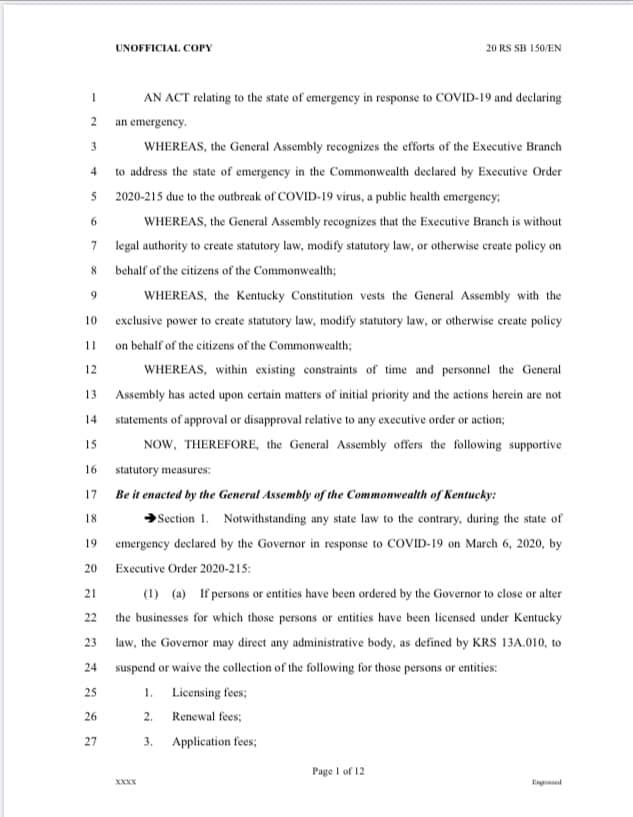
SB 150, the Coronavirus Relief Bill which is headed to the Governor for signature, modifies existing open records and meetings requirements during the state of emergency.
https://apps.legislature.ky.gov/recorddocuments/bill/20RS/sb150/bill.pdf
https://www.kentucky.com/news/coronavirus/article241532646.html
https://www.courier-journal.com/story/news/politics/2020/03/26/coronavi…
It will take effect when Governor Beshear signs it.
The bill extends the deadline for public agency response to an open records request from three days, "excluding Saturdays, Sundays, and legal holidays" to "within 10 days of receipt."
https://apps.legislature.ky.gov/law/statutes/statute.aspx?id=23065
The bill also permits public agencies to restrict personal inspection of public records on agency premises, declaring that an agency "may delay on-site inspection during the pendency of the state of emergency."
https://apps.legislature.ky.gov/law/statutes/statute.aspx?id=23060
Given the far more aggressive actions taken in other places throughout the country, this relaxation of the three day rule is mild.
https://www.staradvertiser.com/2020/03/17/hawaii-news/ige-suspends-publ…
https://www.latimes.com/california/story/2020-03-19/coronavirus-califor…
https://www.facebook.com/419650175248377/posts/646208009259258/?d=n
In some places, public agencies are extending the deadlines for response to several weeks. In other places, agencies are no longer accepting records requests.
The language of SB 150 is slightly unclear. The three business day rule in the current open records law expressly excludes Saturdays, Sundays, and legal holidays. These exclusions do not appear in SB 150.
And the "during the pendency of the state of emergency" language that is clearly stated with reference to suspension of the right of onsite inspection, does not appear in the language extending the three business day deadline for agency response to "within 10 days of receipt."
With respect to open meetings compliance, the most significant change the bill makes is in formally authorizing "live audio teleconferences" in addition to "live video teleconference during the period of the state of emergency."
Neither the advisory opinion issued by Attorney General Cameron on March 18 nor the Executive Order issued by Governor Beshear on the same day authorized "[l]ive audio teleconference[s] if the public agency does not have the technological capacity or availability to provide for a live video teleconference[.]"
https://www.facebook.com/419650175248377/posts/644123412801051/?d=n
https://www.facebook.com/419650175248377/posts/644438352769557/?d=n
This is a departure from long-standing practice but one necessitated by the practical challenges some locations in Kentucky face.
https://www.facebook.com/419650175248377/posts/648450612368331/?d=n
SB 150 also clarifies that all video or audio teleconferenced meetings must be noticed as special meetings under the existing requirements found at KRS 61.823. This means written notice identifying the meeting date, time, place, *and* agenda distributed to agency members and media at least 24 hours before the meeting is scheduled *and* posted "in a conspicuous place in the building where the special meeting will take place and in a conspicuous place in the building which houses the headquarters of the agency."
https://apps.legislature.ky.gov/law/statutes/statute.aspx?id=23047
The bill offers no directions on the posting requirement for public agencies whose "headquarters" have been closed due to the coronavirus. The safest, although not expressly mandated, approach would be posting on the agency headquarters outer door(s) and, ideally, on the agency's website and/or Facebook Page, at least 24 hours before the meeting..
The bill also requires public agencies to indicate that the meeting is being conducted "by live audio or video teleconference," and "provide specific information on how any member of the public or media organization can access the meeting."
Again, the biggest change here is in the provision for a "[l]ive audio teleconference if the public agency does not have the technological capacity or availability to provide for a live video teleconference."
In all cases, agencies will be expected to focus their efforts on compliance with these relaxed requirements.
It bears repeating that public access to records and meetings has never been more important. It must be defended and preserved.


